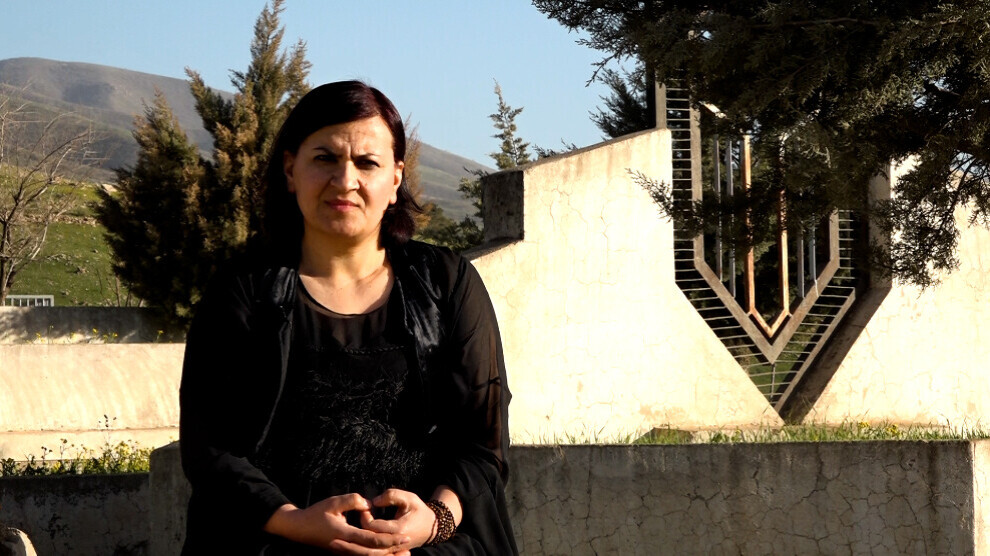Witness of Halabja Massacre: This pain is incomparable
Rengîn Selam Mehmud was five years old when the Halabja Massacre took place. Pointing out that the pain they feel is incomparable, she calls for solidarity to prevent other massacres from taking place.

BÊRİTAN ZINAR
Halabja – On March 16, 1988, the Iraqi Ba'athist government under Saddam Hussein carried out a massacre in the city of Halabja by using chemical weapons. In the attack, more than 5,000 people, including children and women were killed, tens of thousands were injured. The Halabja Massacre, known as the Hiroshima of the Middle East, is great pain and wound in the history of the Kurdish people. The pain of this massacre continues despite the passing years. Rengîn Selam Mehmud was five years old when the massacre took place in Halabja and she remembers what happened in Halabja as if it happened only yesterday.
“Old people and babies were carried on shoulders”
Stating that she has only bad memories about the massacre, Rengîn Selam Mehmud said, “When the attack began, my family left Halabja and went to the village of Ebabeyl. Ebabeyl village was one of the villages that everyone went to when the city of Halabja was bombed. As I remember, people were desperate and busy with their own troubles. Old people and babies were carried on shoulders. They went to places where there was water. People saved themselves from the effects of chemicals by using wet clothes, coal, and yogurt. I didn't know the meaning of chemical was until I grew up.”
“The fire of Newroz was lit despite the pain”
Stating that she witnessed the pain of the people due to the Halabja Massacre, Rengîn Selam Mehmud said, “I remember once we went to Iran. Despite such a bad situation, the people lit the fire of Newroz. We fled to another country, but there was the fire of Newroz, the symbol of being reborn. We settled in the Sunxur Camp of Iran. We had very bad experiences there. People didn’t have water and food. When we arrived at the Sunxur Camp, people greeted us and gave us food and tea. Each family was provided with tents and families were placed in tents.”
“My grandfather died in Sulaymaniyah”
Noting that her family settled in Sulaymaniyah, city of the Federal Kurdistan Region, in 1989, Rengîn Selam Mehmud said, “The chemical had a bad effect on my grandfather, he constantly asked for help and cold things to eat or drink. My grandfather died in Sulaymaniyah. Another interesting thing is that we, as children, did not know how to take a bath together. So my mother took us out of the camp to give us a bath. We always moved to find food. We lived in the city of Erbat for a while and then we returned to Halabja in the 90s. In 1991, we began to rebuild our lives but had to leave Halabja again.”
“Most of the wounded people haven’t healed”
Pointing out the attacks on the region continued in different years, Rengîn Selam Mehmud said, “We were children but didn’t play until the 90s. We didn’t have any toys. Now, I understand what we went through. Most of the wounded people haven’t healed. The pain we feel is incomparable. Genocide was committed in Halabja. Many attacks were carried out on Halabja, but the biggest one was committed in 1988. Crimes against humanity were committed but these crimes are rarely mentioned even in education programs.”
“There are 63 mass graves”
Stating that despite the suffering of the people, the local government isn’t interested in this issue, Rengîn Selam Mehmud continued to talk as follows: “Despite all that has happened to this city and to its people, this city doesn’t receive what it deserves. We don’t have even a hall to mark the 34th anniversary of the Halabja Massacre. No solution has yet been found for the injured. They have received no treatment. People migrate from the city. Thousands of university graduate boys and girls are unemployed in this city. The government can fulfill the promises made in the 34-year period in Halabja. If services had been provided in the city, we could have forgotten the pain of the massacre. According to the latest information, there are 63 mass graves in Halabja. A system will be established to let everyone in Halabja and its surroundings know where the mass graves are. The Kurdish people should also do what is necessary to find out the locations of these mass graves.”
“The people of Halabja need solidarity to rebuild the city”
Noting that the attack on Halabja aimed to destroy the unity of the Kurdish people, Rengîn Selam Mehmud said, “The Kurdish people should take lessons from such attacks. The Kurds should unite. The people of Halabja need solidarity to rebuild the city.”
